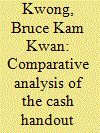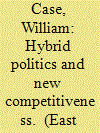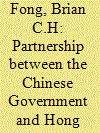| Srl | Item |
| 1 |
ID:
124245


|
|
|
|
|
| Publication |
2013.
|
| Summary/Abstract |
In 2011, Hong Kong SAR government announced an unprecedented policy of cash handouts of 6,000 HKD to all permanent residents at the age of 18 or above as a means of defusing public discontent with economic policy and poor governance. Macau SAR has also been distributing similar cash handouts since 2008 to temper public dissatisfaction and widespread demonstrations. Initially, both SAR governments were very reluctant to initiate universal cash handouts. Unlike standard welfare programmes that are budgeted for annually, the cash payment scheme in Hong Kong SAR was a one-off handout. In Macau SAR, however, the payment scheme went from being a short-term policy to a long-term policy, while other welfare programmes were also allocated more public money. This paper argues that although such cash handout policies are avoidable, they are still being adopted by politicians who place self-interest above the public interest.
|
|
|
|
|
|
|
|
|
|
|
|
|
|
|
|
| 2 |
ID:
172458


|
|
|
|
|
| Summary/Abstract |
The anti-extradition movement in Hong Kong began in June 2019 and has evolved since July into protests against police power and the mainlandization of the territory. Although Beijing supports Chief Executive Carrie Lam and the police, the movement persists amid demands for the creation of an independent commission of inquiry into police actions.
|
|
|
|
|
|
|
|
|
|
|
|
|
|
|
|
| 3 |
ID:
085752


|
|
|
|
|
| Publication |
2008.
|
| Summary/Abstract |
In recounting Hong Kong's chief executive election in 2007, this paper charts the unexpected appearance of an "unauthorized" candidate and the occurrence of vibrant campaigning. Further, as electoral competitiveness increased, the liberal form of authoritarian rule that has characterized politics in the Hong Kong Special Administrative Region (HKSAR) began to change in ways that parallel the electoral authoritarianism practiced in Singapore. This paper argues that such change, if regularized and enhanced, may bring greater stability to the HKSAR's politics, yielding greater legitimacy, popular compliance, and hence, new efficiencies in control. Even so, analysis of the chief executive election shows that this competitiveness was strongly resisted by the central government in Beijing.
|
|
|
|
|
|
|
|
|
|
|
|
|
|
|
|
| 4 |
ID:
131957


|
|
|
|
|
| Publication |
2014.
|
| Summary/Abstract |
Existing literature has long recognized that a partnership has been forged between the PRC government and Hong Kong's capitalist class. However, the implications of such a partnership for HKSAR governance have yet to be thoroughly explored. By examining the formation of this partnership and its consolidation after 1997, this article argues that the business sector's direct access to the sovereign state has fundamentally changed the dynamics of state-business relations in the HKSAR. As a consequence of the partnership between Beijing and the business sector, business elites have taken their concerns straight to the mainland authorities whenever they see their interests affected by the post-colonial state. This kind of circumvention has become a part of post-1997 politics, undermining the relative autonomy of the post-colonial state and resulting in growing cleavages within the state-business alliance during the first 15 years of the HKSAR. Whether and how such a partnership will evolve in the aftermath of the 2012 chief executive election remains to be seen.
|
|
|
|
|
|
|
|
|
|
|
|
|
|
|
|
| 5 |
ID:
131956


|
|
|
|
|
| Summary/Abstract |
Existing literature has long recognized that a partnership has been forged between the PRC government and Hong Kong's capitalist class. However, the implications of such a partnership for HKSAR governance have yet to be thoroughly explored. By examining the formation of this partnership and its consolidation after 1997, this article argues that the business sector's direct access to the sovereign state has fundamentally changed the dynamics of state-business relations in the HKSAR. As a consequence of the partnership between Beijing and the business sector, business elites have taken their concerns straight to the mainland authorities whenever they see their interests affected by the post-colonial state. This kind of circumvention has become a part of post-1997 politics, undermining the relative autonomy of the post-colonial state and resulting in growing cleavages within the state-business alliance during the first 15 years of the HKSAR. Whether and how such a partnership will evolve in the aftermath of the 2012 chief executive election remains to be seen.
|
|
|
|
|
|
|
|
|
|
|
|
|
|
|
|